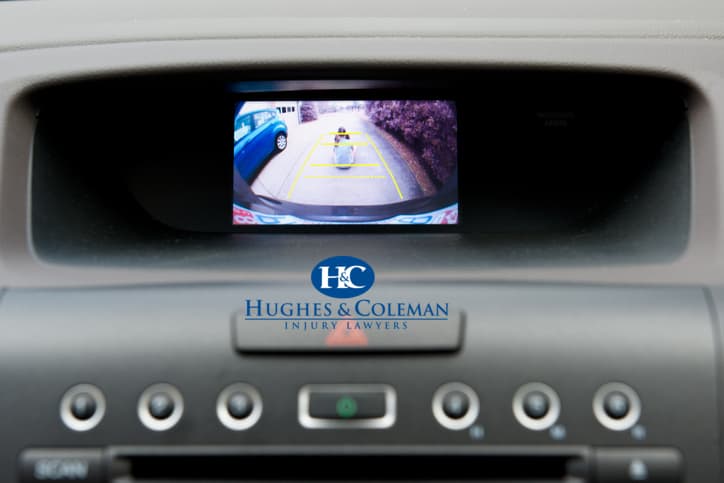-

Backup cameras are now mandatory for all new cars. In this article, we review the benefits of this simple yet effective safety measure – as well as the dangers of putting too much trust in them.
In compliance with a recent National Highway Traffic Safety Administration (NHTSA) requirement, as of May this year, all new vehicles “under 10,000 pounds manufactured or made to sell in the United States” must be equipped by default with a backup camera. This piece of automobile technology, also called reversing camera or rear-view camera, was originally introduced in mass production in the early 2000s. Its purpose is to aid drivers with backup maneuvers so as to prevent injuries and deaths from backup collisions. Such collisions occur when a driver fails to notice a person – usually a small child – in a car’s way while driving in reverse. According to a report by the Insurance Institute for Highway Safety (IIHS), backup collisions result in deaths of 300 people and the injuries of 18,000 more every year.
For many driving law activists – some of whom suffered a tragic loss of a loved one as a result of a backup accident – the introduction of the mandatory rearview video system represents a victory after a long-fought legislative battle. This battle began with the K.T. Safety Act of 2007 which obliged federal transportation officials to “initiate a rulemaking for motor vehicles to require” a variety of safety measures aiming to prevent backup collisions. Backup cameras were one of the mandatory features mentioned in the act. However, it was as recently as 2014 when NHTSA finally announced that a compulsory adoption of these measures would take place in May 2018. This announcement came only after a lawsuit had been brought against the U.S. Department of Transportation a year earlier. The lawsuit accused the Department of having repeatedly pushed back the introduction of the backup camera requirement.
From an outside perspective, this apparent controversy surrounding a potentially life-saving law may seem a little baffling. In this article, we will explain both the argument for backup cameras as well as some of the reservations the skeptics of this idea have raised in the past. We will also take a look at what this controversy can teach drivers about ensuring safety while performing reverse maneuvers.
What NHTSA says about backup camera safety
The NHTSA promotes a wide range of driver assistance technologies. On a dedicated website, the agency confidently calls the rearview video system, or backup cameras, a “lifesaving technology”. Such statements do seem to be backed up by some studies, for example, ones conducted by the IIHS. In one study, backup cameras helped reduced the blind zone in tested cars – the area behind the vehicle that a driver cannot see directly or in the mirrors – by 90 percent on average. In the other study, drivers who used a backup camera while reversing had “the fewest collisions with a stationary target” (a dummy) in comparison to drivers who used parking sensors or both the camera and the sensors.
It’s worth noting, though, that in the second of the above-mentioned studies, 56% of drivers aided with a rearview video system ended up hitting the dummy anyway. The danger of causing a backup collision is, then, present even when a car is equipped with a rearview video system and that’s why NHTSA notes that it is “important to remember that rearview video systems are not a replacement for mirrors or turning around to look”.
What skeptics say about backup cameras being mandatory
Some skeptics of the new requirement may point to the data gathered by NHTSA between the years 2008 and 2011. In this period, the number of cars with backup cameras installed “more than doubled from 32 percent to 68 percent of all new cars sold”. However, the number of injuries reported every year dropped only 8% – from 13,000 reported in 2008 to 12,000 in 2011.
In the same time period, however, the fatality rate dropped by 31%. Some have pointed out that backup collisions are responsible for a relatively small number of deaths per year, nevertheless, according to some estimates, if every car on the road has a backup camera, it would save between 58 and 69 lives each year. The benefit, then, seems to be obvious and worthwhile.
The Takeaway
Rearview camera systems are now required in all new cars sold or manufactured in the U.S. This solution does seem to have some benefits when it comes to safety on the road – especially in relation to backup collisions. Still, drivers must be acutely aware that – with or without a backup camera – the danger of becoming distracted and hitting an object behind the vehicle while driving in reverse is ever-present. Each driver has a responsibility to develop good habits related to reverse maneuvers such as using not only the view from a backup camera but also scanning the side mirrors and rearview mirror. When in doubt as to the visibility and blind spots, a driver should get out of the car and make sure the path is clear of people and objects. Applying these simple suggestions, along with a rearview video system, can greatly reduce the risk of causing a backup collision – and can even save lives!
If a car reversed into you and caused an injury, contact us today.
If a car reversed into you and you were injured, contact a car accident lawyer today. Our legal team can help determine fault to get you the most compensation possible.
Get In Touch Today!
We offer free consultations 24/7 and there will always be someone here to take your call. Call our personal injury lawyers today for a free consultation or fill out this form and we will contact you.
We serve clients across Tennessee and Kentucky and we have several offices throughout both states. See all of our locations and contact us today.


